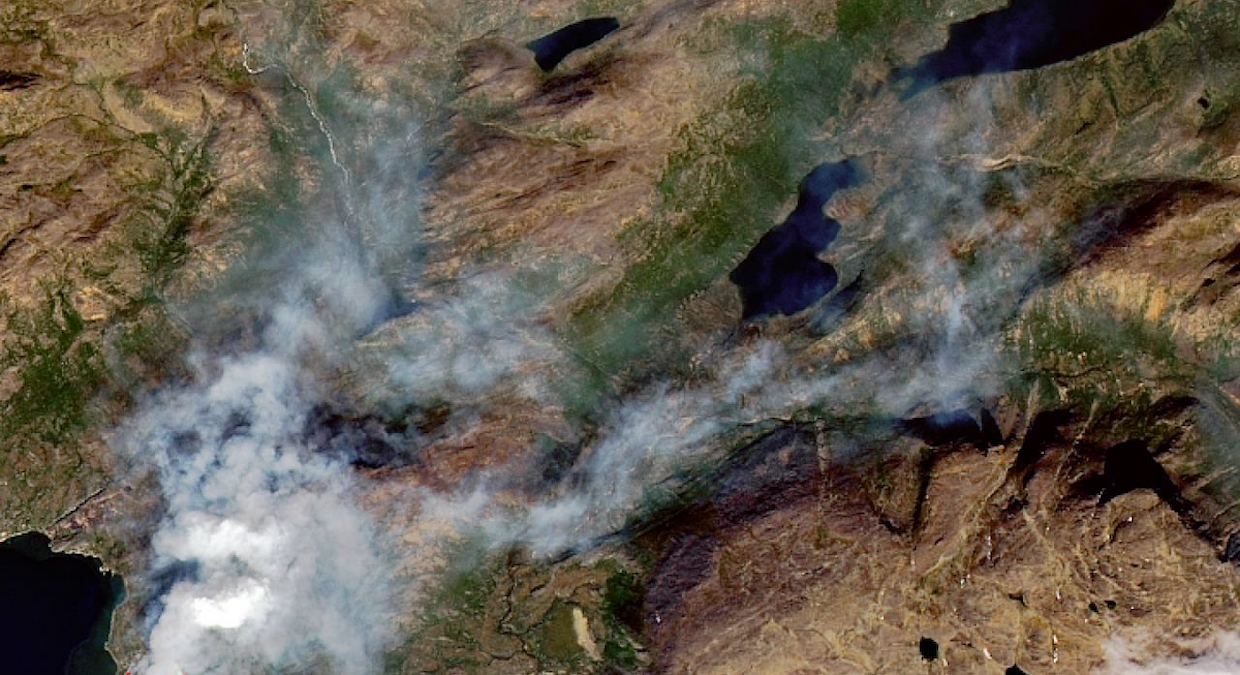

A fire in Greenland on July 10. Zombie fires smolder underground for months, notably in dense peatlands, and then flare-up when it grows warmer and drier. NASA
By Mark Kaufman
Some fires won’t die.
They survive underground during the winter and then reemerge the following spring, as documented in places like Alaska. They’re called “overwintering,” “holdover,” or “zombie” fires, and they may have now awoken in the Arctic Circle — a fast-warming region that experienced unprecedented fires in 2019. The European Union’s Copernicus Atmosphere Monitoring Service is now watching these fires, via satellite.
Are these 'zombie' fires? As the snow melted in Arctic Siberia last week, a number of fires have been detected by satellites. Did these fires smoulder through the winter after widespread #wildfires last summer? [short thread 1/5] 🔥🧟 pic.twitter.com/3jYoHm7a0c
— Dr Thomas Smith 🔥🌏 (@DrTELS) May 6, 2020
🟠 Siberian #wildfire🔥 within the #Arctic Circle at 68.6°N in the #SakhaRepublic, South of #Chersky, #Russia🇷🇺 26 May 2020 #Copernicus #Sentinel-2🛰️ Full-size➡️https://t.co/2FrMSRQTFH + https://t.co/4D5IGsgskf #RemoteSensing #scicomm #OpenData #Siberia Image is about 18 km wide pic.twitter.com/Muoxqn4Ofg
— Pierre Markuse (@Pierre_Markuse) May 26, 2020
If they are truly zombie fires, that means 2019’s blazes may ignite robust 2020 fires this summer.
“If this is the case, then under certain environmental conditions, we may see a cumulative effect of last year’s fire season in the Arctic, which will feed into the upcoming season and could lead to large-scale and long-term fires across the same region once again,” Mark Parrington, a senior scientist and wildfire expert at the European Union’s Copernicus Atmosphere Monitoring Service, said in a statement.
Overall, fires in the Arctic Circle — which can release colossal amounts of heat-trapping carbon dioxide and methane into the atmosphere — have been normal this year, but they’re expected to pick up steam in June. What’s more, they’ll likely be enhanced by both Russia’s hottest winter on record and recent Siberian heat waves, where temperatures reached some 40 degrees Fahrenheit above average.
“We could have quite a lengthy fire season,” said Smith. Wildfires feast on dry vegetation, Smith emphasized, and there will likely be ample amounts of parched land this summer.
So What Happens Now?
In the future, fire researchers expect an uptick in zombie fires. That’s because the planet is relentlessly warming, particularly in the Arctic, which means more ready-to-burn vegetation. It’s already happening. “Arctic fires are becoming more common overall,” explained Miami University’s McCarty.
And some of these fires will inevitably smolder all winter, under the snow. “With a warmer Arctic, we’re more likely to see overwintering fires,” noted Smith.
It’s challenging to stop zombie fires. They can happen in extremely remote places, without any roads or means of dousing them before they erupt. “We have no way of fighting them,” said McCarty. “They’re often fairly far-removed. How are we going to put them out?”
It’s a question of profound importance in the decades ahead. Preventing human-caused Arctic wildfires will be critical, emphasized McCarty. That’s because Arctic fires aren’t just burning trees, they’re often burning through peatlands, which release bounties of the heat-trapping greenhouse gas methane into the air. When it comes to trapping heat, methane is 25 times more potent than carbon dioxide over the course of a century.
It’s a vicious cycle. The warming Arctic produces more fires. More fires burn more forests and peatlands. This releases more methane and carbon dioxide into the air. This contributes to ever more planetary heating.
“Not stopping these zombie fires means further degrading these Arctic ecosystems,” said McCarty. “Further warming leads to more zombie fires. It’s not great.”
This story originally appeared in Mashable and is republished here as part of Covering Climate Now, a global journalism collaboration strengthening coverage of the climate story.
- The Arctic Is on Fire and Warming Twice as Fast as the Rest of the Earth - EcoWatch
- Arctic Wildfires Are Changing, With Big Implications for the Global Climate - EcoWatch
- Climate Change Could Make 'Zombie' Fires Increasingly More Common

 233k
233k  41k
41k  Subscribe
Subscribe 